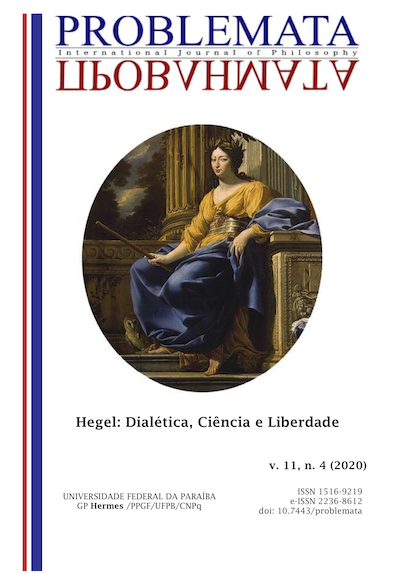ONTOLOGY AND POLITICS IN HEGEL:
THE RELATIONSHIP BETWEEN WORK AND LANGUAGE IN THE FORMATION OF CONSCIOUSNESS AND ETHICAL LIFE
DOI:
https://doi.org/10.7443/problemata.v11i4.56365Keywords:
Hegel, Ontology and politics, Formation, Consciousness, Ethical LifeAbstract
This article aims to present the first steps of a research developed in the scope of Hegelian thought, focused on the problem of how the relationship between labor and language occurs in the formation of consciousness, and how it is expressed in the tension established between the ethical substance (sittliche Substanz) and moral action. The emphasis on the relationship between labor and language is justified in the sense of carrying out a reading of Hegelian political philosophy, framed by its ontological conception of work as a maker of consciousness and, consequently, of the relationship between content and form resulting from this process, which it acquires practical expression in language, at the same time that it forms the subject who acts in social life as reality (Realität) in which ethos is manifested as an ethical substance and, therefore, effectiveness (Wirklichkeit) of ethical life (sittliche Leben). In this first moment, we will present this relationship as a warp between ontology and politics based on the exposition of the first approximations we made between the Phenomenology of the Spirit and the Philosophy of Law.
Downloads
References
ARAÚJO, Wécio P. O tortuoso caminho da contradição: notas sobre a Ideia na Lógica de Hegel. In: BAVARESCO, Agemir; ORSINI, Federico; TAUCHEN, Jair; PERTILLE, José Pinheiro; MIRANDA, Marloren Lopes [orgs.]. Leituras da lógica de Hegel – Volume 3. – Porto Alegre: Editora Fundação Fênix, 2019. Disponível em: < https://www.academia.edu/41722537/O_TORTUOSO_CAMINHO_DA_CONTRADIÇÃO_NOTAS_SOBRE_A_IDEIA_NA_LÓGICA_DE_HEGEL > Acesso em: 26. Mai. 2020.
FERRER, Diogo. A Gênese do Significado: introdução ao pensamento de Hegel. Porto – Portugal: Fundação Eng. Antônio de Almeida, 2016.
HABERMAS, Jürgen. Técnica e ciência como “ideologia”. – I. ed. – São Paulo: Editora Unesp, 2014.
KONDER, Leandro. Hegel: a razão quase enlouquecida. – Rio de Janeiro: Campus, 1991.
LIMA VAZ, Henrique C. de. Escritos de Filosofia II: ética e cultura. – São Paulo: Edições Loyola, 1988.
HEGEL, G. W. F. Enciclopedia das Ciências filosóficas em compêndio: 1830. Volume I: A ciencia da Lógica. – São Paulo: Loyola, 1995a.
______. Enciclopedia das Ciências filosóficas em compêndio: 1830. Volume III: A Filosofía do Espírito. – São Paulo: Loyola, 1995b.
______. Fenomenologia do Espírito. – 5. ed. – Petrópolis, RJ: Vozes: Bragança Paulista, Editora Universitária São Francisco, 2008.
______. Phänomenologie des Geistes. - Felix Meiner Verlag, Hamburg, 1999a.
______. Grundlinien der Philosophie des Rechts. - Felix Meiner Verlag, Hamburg, 1999b.
______. Enzyklopädie der philosophischen Wissenschaften im Grundrisse: 1830. - Felix Meiner Verlag, Hamburg, 1999c.
INWOOD, Michael. Dicionário Hegel. – Rio de Janeiro: Jorge Zahar Ed., 1997 (Dicionário de Filósofos).
LEBRUN, Gérard. A Paciência do Conceito: ensaio sobre o discurso hegeliano. – São Paulo: Editora UNESP, 2006.
TAYLOR, Charles. Hegel: sistema, método e estrutura. – São Paulo: Realizações Editora, 2014.
Downloads
Published
Issue
Section
License
Authors who publish with this journal agree to the following terms:
- Authors retain copyright and grant the journal right of first publication with the work simultaneously licensed under a Creative Commons Attribution License that allows others to share the work with an acknowledgement of the work's authorship and initial publication in this journal.
- Authors are able to enter into separate, additional contractual arrangements for the non-exclusive distribution of the journal's published version of the work (e.g., post it to an institutional repository or publish it in a book), with an acknowledgement of its initial publication in this journal.
-
- Authors are permitted and encouraged to post their work online (e.g., in institutional repositories or on their website) prior to and during the submission process, as it can lead to productive exchanges, as well as earlier and greater citation of published work (See The Effect of Open Access).





